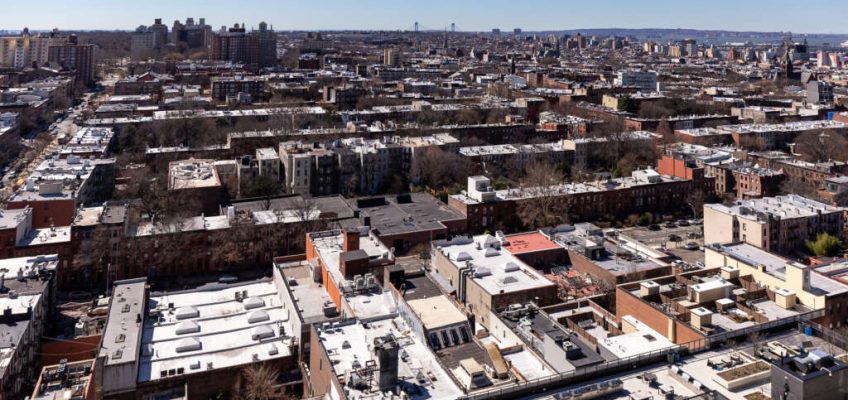“It’s clear that this system can’t be salvaged with iterative tweaks. It needs political courage and bold reforms that will reboot the housing market.”
The view from Dean Street near Vanderbilt Avenue in Brooklyn. (Phot by Adi Talwar)
Every week, I speak with dozens of renters who feel overwhelmed with crippling rent increases, unresponsive landlords, and a system designed to wear them down. Many are ready to leave the city altogether because they can’t afford to stay. As New York’s mayoral candidates debate zoning targets for 2035, renters are dealing with an urgent, immediate crisis that just can’t wait.
It’s clear that this system can’t be salvaged with iterative tweaks. It needs political courage and bold reforms that will reboot the housing market. If the next mayor is serious about housing, here are five policies they should kickstart in their first 100 days:
Turn city voucher programs into a cash-based housing allowance
The city’s voucher program is failing the people it is supposed to serve. Despite an increasing budget, growing from $174 million in 2019 to over $816 million in 2024, the program is underperforming. A recent audit by the State Comptroller found that households approved for CityFHEPS waited an average of 10 months to move out of shelters, with some families waiting more than three years for placement.
Even when renters finally secure vouchers, they’re blocked by endless administrative red tape and widespread landlord discrimination. These vouchers can’t be used for shared housing, sublets, or rooms in family homes, even though these are common, affordable options for many renters.
Instead of forcing tenants to navigate a rigid and bureaucratic system, the city should issue portable, cash-based subsidies, paid directly to renters. A portable benefit would also improve voucher acceptance, giving renters leverage in lease negotiations and reducing the stigma that often accompanies subsidy holders.
Make rental assistance available before eviction happens
The city needs to intervene earlier. The data is clear: an average shelter stay for a family costs the city over $100,000 per year, while early rental assistance can cost as little as $3,500. Beyond the financials, eviction prevention keeps people rooted in their communities. If we can stop eviction before it begins, we can keep our neighbors safe and healthy and prevent the lasting damage that forced relocations or foreclosures can cause.
Reform the Rent Guidelines Board (RGB) for smarter rent policy
Every year, the RGB votes on rent increases for over 1 million stabilized apartments. However, the board applies the same adjustment to all units, regardless of the borough, building condition, or landlord history.
That’s outdated. Why should a landlord with hundreds of open violations be able to increase rents? Why should a luxury rent-stabilized building in Hudson Yards get the same increase as a small owner with six units in Brooklyn? We need a policy that reflects the realities of New York’s housing stock.
Smart rent regulation must be data-driven, context-aware, and tied to tenant protections. The next mayor needs to appoint a bold and reform-oriented board, and the board also needs to be given the mandate and support to reshape and reinterpret how increases are established.
Reward good landlords with real incentives
Enforcement alone won’t fix our housing crisis. We also need to reward the landlords who maintain their properties and rent responsibly. A “Good Landlord Program” could offer:
Tax breaks for clean code records
Low-interest loans for capital improvements
Fast-track permits for owners who accept vouchers and comply with the law
We know incentive programs can work. In Phoenix, Arizona, the Threshold program incentivized landlords to accept housing vouchers, resulting in over 1,000 previously unhoused individuals gaining access to homes or apartments. Before its launch, about 65 percent of voucher recipients could find landlords willing to rent to them, a figure that increased to almost 90 percent after the program’s implementation.
Too often, we treat all landlords the same. We need to start recognizing and rewarding those who are part of the solution.
Fix Housing Preservation & Development (HPD) enforcement and start collecting fines
New Yorkers report heat outages, leaks, mold, and pest infestations every day, but code enforcement is inconsistent. In 2024, housing code violations in New York City jumped 24 percent, totaling 895,457 violations, yet many landlords face minimal financial consequences. HPD is understaffed, and most fines issued to bad landlords go uncollected. It’s estimated that over 97 percent of fines issued to delinquent landlords are never collected. The next mayor needs to give city agencies the mandate and resources to enforce existing laws and reinvest penalties into housing support.
These aren’t radical proposals, but they do challenge the status quo. The next mayor can’t afford to govern by appeasing every stakeholder. We need to rip out the failing parts of this system before even more New Yorkers are pushed out. Change in New York is never easy, but these are implementable, common-sense policies that can be set in motion on day one.
Housing is a right, not a privilege. We need a mayor that won’t just manage the housing crisis, but truly reimagine how New Yorkers live.
Allia Mohamed is the co-founder and CEO of openigloo, a NYC-based rental platform that helps tenants find quality housing by crowdsourcing building reviews, surfacing city data, and promoting landlord transparency.
The post Opinion: What NYC’s Next Mayor Must Do On Housing In The First 100 Days appeared first on City Limits.


Leave a Reply